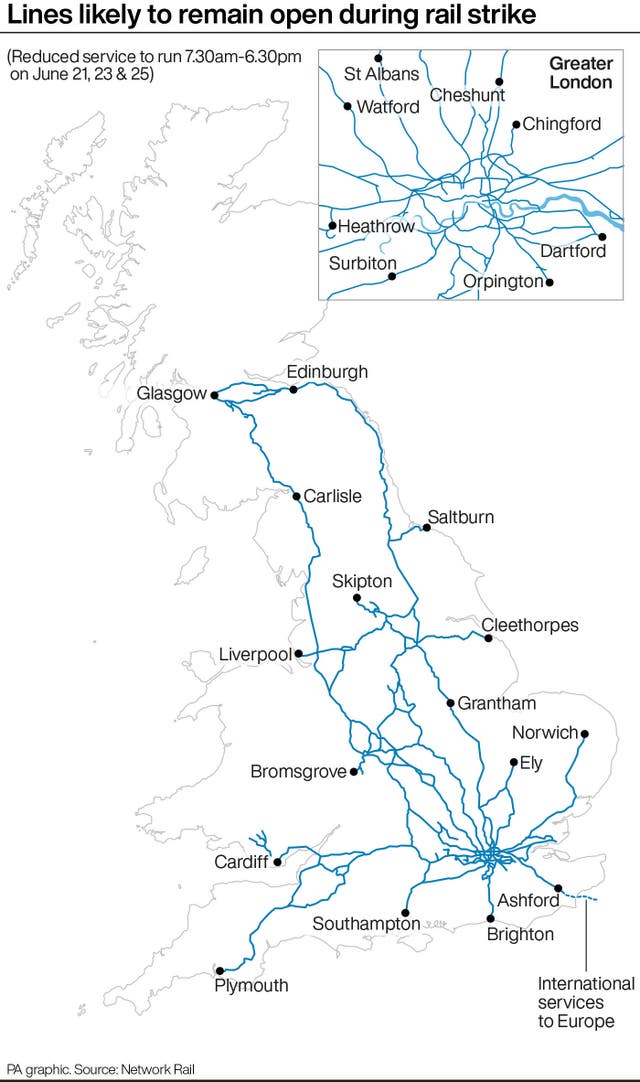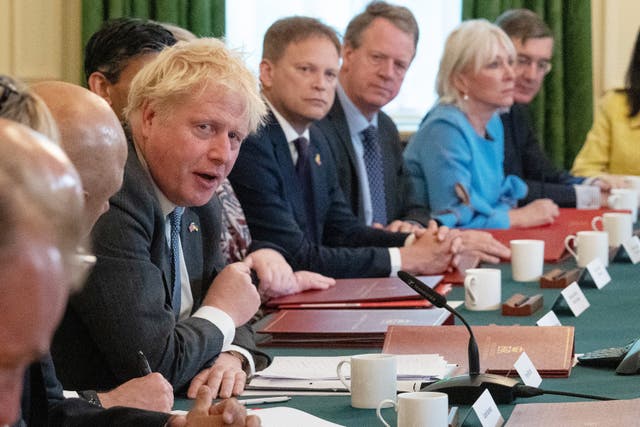
Ian Payne 4am - 7am
21 June 2022, 16:54

Boris Johnson warned the public they must ‘stay the course’ in order to ensure the railways are modernised despite the industrial unrest.
Prime Minister Boris Johnson put the public on notice for further strike action as Downing Street said it would “not give in” to demands from the rail unions.
Mr Johnson warned commuters they must be ready to “stay the course” and urged rail bosses and unions to agree on a modernisation package to safeguard the future of the industry.
Mr Johnson told the Cabinet that, without fundamental changes to the way the system operates, rail firms risk going bust and passengers face ever-higher prices that could ultimately lead to them abandoning train travel.
The Prime Minister addressed his team on Tuesday as commuters endured the biggest rail strike in a generation, causing transport misery for millions, with further action by the RMT union set for Thursday and Saturday.
Mr Johnson called for the “union barons to sit down with Network Rail and the train companies” and agree to a package of reforms.
About 40,000 members of the Rail, Maritime and Transport (RMT) union at Network Rail and 13 train operators have walked out in a bitter dispute over pay, jobs and conditions.
The strike is causing “significant disruption and inconvenience up and down the country”, the Prime Minister said.
The action is making it “more difficult for people to get to work, risking people’s appointments, making it more difficult for kids to sit exams – all sorts of unnecessary aggravations”.

Mr Johnson set out why he believed the strikes are “so wrong and so unnecessary”, pointing to the levels of support offered to the industry during the pandemic and the “colossal” investment in rail infrastructure.
“We believe in our railways, we believe in our railway infrastructure as a vital part of levelling up across the country,” he said.
But he added that in order to make the promised investments “we have got to have reform in the way that the railways work”.
“It cannot be right that some ticket offices… are selling roughly one ticket per hour,” he said.
“We need to get those staff out from behind plate glass, on to the platforms, interacting with passengers.”
But in a sign that there could be more trouble to come as a result of the dispute between the RMT, Network Rail and train firms, Mr Johnson said: “We need, I’m afraid, everybody – and I say this to the country as a whole – we need to get ready to stay the course.
“To stay the course, because these reforms, these improvements in the way we run our railways, are in the interests of the travelling public, they will help to cut costs for farepayers up and down the country.”
But the modernisation programme is also in the interests of workers because “if we don’t do this, these great companies, this great industry, will face further financial pressure, it will go bust and the result will be they have to hike up the cost of tickets still further”.
That would result in the “disaster” of declining rail use, he said.
“This Government was elected to do the difficult things and to stay the course,” Mr Johnson said, as he urged ministers to support Transport Secretary Grant Shapps.
Downing Street highlighted “outdated approaches” in the industry “which have no place in the modern workplace”.
There were examples of “staff refusing to share vans”, blocking apps and “restricting the use of technology”, managers being only able to roster in whole teams of workers “regardless of the size of the task”.
The Prime Minister’s official spokesman said: “The Prime Minister’s view is it is in the long-term interest of both the country and the public to not give in to some of these demands which would stop us being able to modernise the railways.”
It was ultimately up to the unions whether there is further industrial action following Saturday’s rail strike.
“We wouldn’t want this to be inflicted on the public for longer than necessary and indeed for it to damage people’s confidence in using our railways for longer than necessary,” the spokesman said.

“But it is very much one for the unions to decide.”
With the prospect of unions in other parts of the economy taking action in a potential “summer of discontent” as pay fails to keep pace with rising inflation, Downing Street said preparations were in place to mitigate strikes.
“There is certainly a great deal of work going on across government to mitigate any disruption that we might see from strike action,” the spokesman said.
“Clearly any sort of strike will be disruptive but we can take steps to mitigate it.”
The Cabinet meeting was chaired by Mr Johnson a little over 24 hours after he underwent sinus surgery.
His spokesman said: “He’s in very good health.”